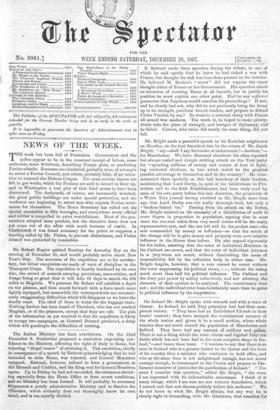Mr. Bright made a_powerful speech to his Rochdale neighbours on
Monday, on the text furnished him by the return of Mr. Jacob Bright, "my—shall I say fortunate or unfortunate ?—brother,"-- for Manchester. We have discussed elsewhere his often repeated but always varied and always striking attack on the Toty 'party for "spending millions of -money and oceans of beer in fight- ing contested elections, to lose which wciuld be the greatest possible advantage to themselves and to the country." He com- miserated them specially on this last treachery of their leaders, mentioning that Lord Derby, in spite of his faithfulness to Pro- tection and to the Irish Establishment, had been truly read by some of his own party before this last desertion, the proprietor of a Welsh Tory journal having confided to Mr. Bright some time ago that Lord Derby was not really thorough-bred, but only a "broken-haired 'un." Passing from his attack on the Tories, Mr. Bright insisted on the necessity of a distribution of seats- irk some degree in proportion to population, arguing that in most cases the one seat taken from very small towns will be the really representative seat, and the one left will be the pocket seat—the seat commanded by money or influence—so that the result of the change will be to give money and property even more relative influence in the House than before. He also argued vigorously for the ballot, asserting that the votes of individual Ministers in the Cabinet are secret, and that the votes of individual jurymen in a jury-room are secret, without diminishing the sense of responsibility felt by the collective body in either case. Mr. Bright forgets, however, that a vote cannot be secret without the voter suppressing his Volitical views, i. e., without his losing much more than half his political influence. The Cabinet and the Jury gain power by acting collectively, and not allowing the elements of their opinion to be analyzed. The constituency does not ; and the individual voter losesindefinitely more than he gains in political influence by the suppression.






























